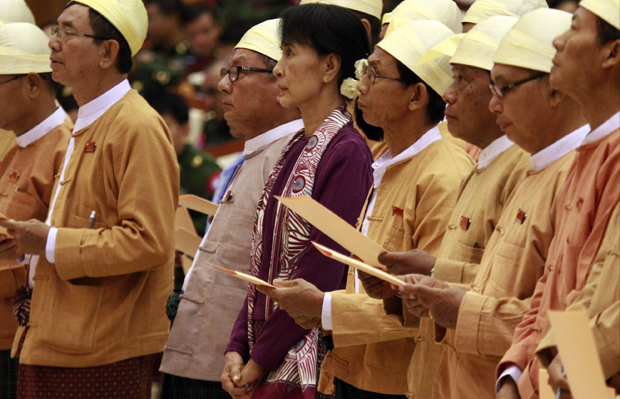
Aung San Suu Kyi, of the National League of Democracy, being sworn in as a member of the Myanmar parliament on May 2, 2012. Photo credit: AP/Khin Maung Win
In my first article I wrote about the historic election in Myanmar in which the National League for Democracy (NLD), led by former political prisoner Aung San Suu Kyi, gained seats in parliament for the first time ever. Last week NLD’s elected members took their oaths of office to officially begin serving in parliament (though not without some hiccups- see below). They can now begin to fight for democracy and democratic reform from within the system.
A symbolic event to be sure, but how much actual change will result from it is still, sadly, unknown.
After the swearing in ceremony, Suu Kyi commented, “We would like our parliament to be in line with genuine democratic values. It’s not because we want to remove anybody, we just want to make the kind of improvements that will make our national assembly a truly democratic one.” It is worth recalling that unelected military appointees still comprise 25 percent of the assembly.
So now the paradox of Myanmar politics begins. Suu Kyi and her democracy-demanding colleagues have a say in the government for the first time. But the NLD is only a small minority in parliament, and said government is the same one that has suppressed the opposition party for many years and put its leader under house arrest for almost 20 years.
On the one hand, the government of President Thein Sein has been praised for instituting reforms including releasing hundreds of political prisoners, signing cease-fires with (some) rebels, easing media censorship, and holding the April 1 election that allowed Suu Kyi’s party to enter parliament and abiding by its results (which the military regime has not always done). U.S. Secretary of State Hillary Clinton said Myanmar has made “strides toward democracy and national reconciliation.”
Yet half a million Myanmar refugees remain in exile, and the ruling regime still holds hundreds of political dissidents in prison. Plus government military forces continue a brutal campaign against ethnic Kachin rebels. Last week it was reported that fighting in late April resulted in 31 deaths and caused 70,000 villagers to flee.
What’s more, the legislature that the NLD is now a part of was formed after a 2010 election that many election observers–and the NLD itself–blasted as fraudulent and fixed. Suu Kyi and her colleagues elected to parliament initially refused to be sworn in last week because of the wording of the oath, saying it indicated too much deference to the existing constitution, which they have vowed to alter. They eventually backed off and were sworn in, in what some believe is the first of many concessions NLD will make to the military rulers.
While Suu Kyi and the NLD have officially taken office, Soe Aung, a spokesman for the Thailand-based Forum for Democracy in Burma, expects little to change for Myanmar’s citizens. But Aung also notes the people “have much hope in her and her party.”
I think that is a good characterization of where Myanmar stands today: the people don’t expect much change, but hope for it. It is hard to say what impact Suu Kyi and her democracy supporters will have. It is up to them, President Sein, and the ruling regime to develop a working relationship. Let us all hope this occurs. Let the democracy building begin.